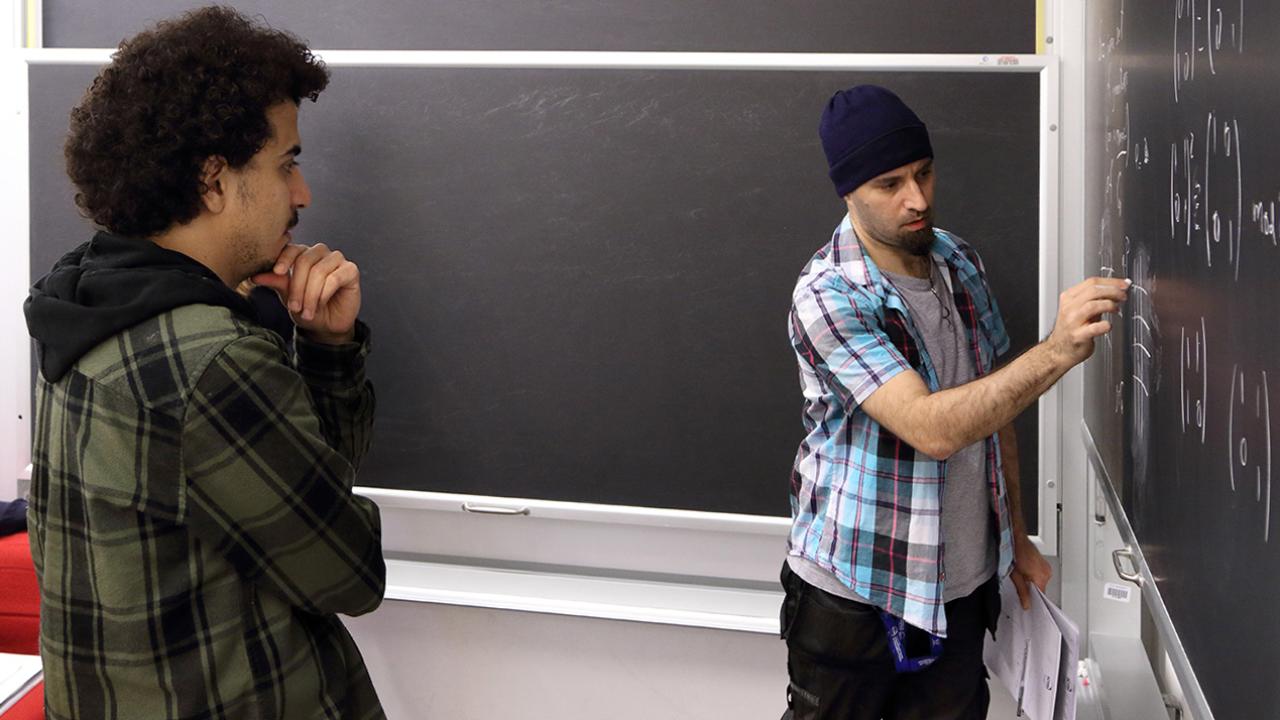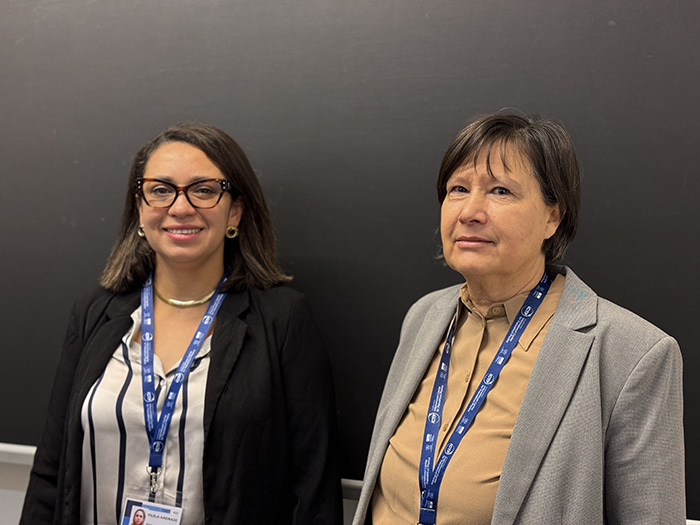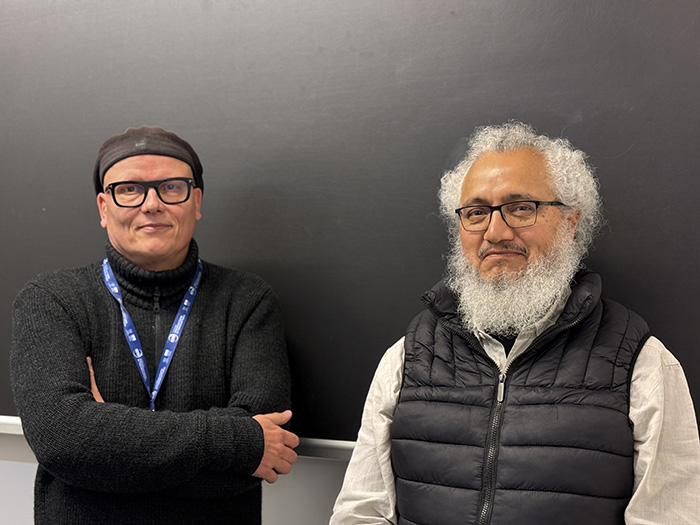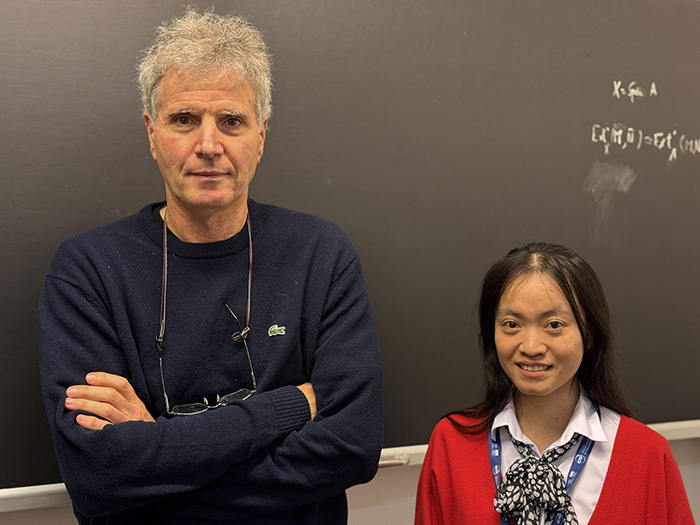
Mathematicians need little equipment – a blackboard and some chalk or alternatively a pencil and some paper -- to do their job. Good collaborators and some uninterrupted, quiet time, away from administrative tasks and frequent emails are also essential. The partnership that ICTP and the Italian National Institute of High Mathematics (INdAM) started ten years ago aims precisely at fostering new collaborations by providing mathematicians working in developing countries and INdAM members with the working conditions they need to exchange ideas and work on new projects together.
The ICTP-INdAM partnership supports one-to-two-month visits to ICTP for pairs or small groups of mathematicians, one of whom must come from a developing country, while the others are members of INdAM. While at ICTP, they work on a collaborative project and can benefit from ICTP’s unique environment to support their research. ICTP is currently accepting applications for projects to be carried out in the second part of 2025.
In the first half of 2025 the partnership will support five collaborative projects. Three of the research pairs spent time at ICTP in January and we have interviewed them to learn more about their experience.

Aline Vilela Andrade and Valentina Beorchia
Aline Vilela Andrade and Valentina Beorchia started to collaborate in March 2024, when Vilela Andrade arrived in Trieste with her husband, also a mathematician, and her four-year-old son to spend a one-year sabbatical leave from her role at Universidade Federal de Minas Gerais, Brazil and collaborate with Beorchia, a professor at the University of Trieste working on similar research topics.
The two applied to the ICTP-INdAM program to collaborate on a new project and were selected to spend two months at ICTP, where they have been sharing an office since early December.
What is your project about?
Beorchia: “We both work on algebraic geometry. The project that we have been working on here at ICTP concerns singularity theory for projective curves and hypersurfaces.”
What have you learnt by working together?
Vilela Andrade: “I learnt a lot of new mathematics this year, because this is my first time working on singularities, and despite them being related to what I used to work on -- classification of vector bundles and curves – sometimes in mathematics you need to change your topic of interest very slightly to access a whole new world. Thanks to Valentina, I have learnt a lot during my time here. Italy is a dreamland for algebraic geometers. The way in which Italian mathematicians think about this subject is different from that in other parts of the world and Valentina is a great algebraic geometer. I have learnt a lot from her.”
Beorchia: “I am not an expert in singularity theory, but through the work of some colleagues I learnt that it is possible to apply some global geometric techniques to answer questions in singularity theory, that is a very active field at the moment. This was new for both of us. Interestingly and unexpectedly, we found various results and have already written two papers, one of which has already been published. We have also been contacted by other colleagues who expressed their interest in what we have done and that is always positive.”
What has this experience meant to you?
Vilela Andrade: “Coming to Trieste has been a great opportunity for me and for my career. My son was born during the pandemic, and my career slowed down afterwards. Moving to a new place and starting working on a new project was a great way to gain new momentum to move forward as a researcher. It has been very nice to be able to focus again on research. I also had a wonderful experience here in Trieste. I felt very welcome from the first moment.”
Beorchia: “Starting a new collaboration with someone coming from the other side of the world has been very stimulating for me, and ICTP provided us with an excellent environment. We are very grateful for this opportunity. As soon as we arrived here, we made immediate progress on our project, because we could focus quietly on our research. It has been very nice to collaborate with Aline. Collaborations are important, but not always easy. You need to have similar research interests and to get along well. It works best when you have a similar personality, and in general I tend to prefer working with women, because there is less competition between us. Aline and I have worked together in a very respectful and positive way, each working independently and then bringing our ideas together. I think ours is the most beautiful job, and all the more if one can do it in a nice environment, as it has been for us.”
What have you liked the most about staying at ICTP?
Vilela Andrade: “The environment here is great and everyone has been very friendly and helpful with us. I have particularly appreciated the library, because it gave me access to many journals with a paywall, that I do not usually have access to at my university. Although the most recent research is now available in preprint for free, sometimes the articles online are not updated after review and they may contain mistakes. It is important to have access to the reviewed versions. Moreover, here I can have access to old papers, that are still important to understand key concepts.”
Beorchia: “The quiet environment here at ICTP, the fact that everything is organised to help researchers focus on their work, with less administrative tasks to carry on, have been very important factors. I also particularly appreciate the library here and the fact that there are many printed books still available. Searching for resources online works well when you already know what you are looking for, but being able to search through the pages of a book is something that I appreciate very much and ICTP’s library is one of the best for mathematics.”

Pedro Luis Del Angel Rodriguez and Frank Neumann
Pedro Luis Del Angel Rodriguez (CIMAT - Centro de Investigación en Matemáticas, Mexico) and Frank Neumann (University of Pavia, Italy) met at CIMAT in 2015, where Neumann was visiting to collaborate with a common colleague. It did not take long to realise that they had common research interests in algebraic geometry, arithmetic geometry and number theory, and they quickly started working together. They arrived at ICTP in early January for a one-month visit, and have been sharing an office since. This is the longest period of time they have spent working in the same place.
Why did you decide to apply to the ICTP-INdAM Research in Pairs program?
Neumann: When collaborating on a project it is essential to find time to discuss. However, administrative tasks and teaching duties often make it difficult to find the time to do that, especially when far apart. Looking for an opportunity to share some time in the same place, we started looking at the various programmes for research in pairs and decided to apply to that organised by ICTP. I am very interested in collaborating with scientists from the Global South and this program stood out for me. I was a postdoc in Göttingen and Barcelona before moving to Leicester and now to Pavia and I have been at the ICTP in the past for various schools and workshops at different stages of my career. Recently I also taught in Lahore, Pakistan as part of the International Mathematics Master organised by ICTP.
Del Angel Rodriguez: “I also was at ICTP before. When I was a PhD student I attended a 6-week conference in algebraic geometry that made me realise that ICTP is a fantastic place to be. ”
What have you been working on?
Neumann: “During the three weeks we have spent here so far, we have started working also on a new direction of the project we included in our proposal. Before coming here, we found out that there are some still unexplored aspects of our original problem that involve the cohomology of algebraic stacks. We set out to define a new cohomology theory which ultimately could be applied also to our original problem, in particular to perform calculations. This is something we started discussing here and it is really an outcome of our stay at ICTP as part of the ICTP-INdAM program.”
Del Angel Rodriguez: “I can tell you something more about this new direction. As mathematicians, we often ask how we can classify different objects. Sometimes classification comes easily, and you can do that with set theory, but at other times set theory is not enough and you need to give some structure to your set. What we are trying to do now is to build a space that helps us classify certain geometric objects. We call such classifying space a moduli space. These spaces can be very complicated and the question is how to understand them. This can be done by constructing a cohomology theory that associated some algebraic invariants to the moduli space.”
What has your experience been during this visit?
Del Angel Rodriguez: “I am very happy to be here, especially because this experience has taken us away from the bureaucracy and all the administrative duties of everyday life and has given us time to just do mathematics. It has been fantastic to be here and I hope that the program will continue in the future.”
Neumann: “During the Covid-19 pandemic we all realised that it is possible to collaborate productively even when far apart, and many institutions have committed to discourage non-essential travelling in order to reduce their carbon footprint. I think that programs like this one, which allow for long-enough visits, make travelling worthwhile. In-person discussions are much better, and sharing an office means that we can take advantage of all sorts of informal conversations, over lunch or over a coffee, to exchange ideas. We should not underestimate the importance of these moments and this program is perfect for that.”
What did you particularly appreciate about your stay at ICTP?
Neumann: “The library has been very useful. Access to research literature is crucial but more and more institutions are moving away from buying access to academic journals, so I particularly appreciated the possibility to read a varied range of journals. Here one can also find many printed books, which are great. I also enjoyed the fact that ICTP is close to the sea, that gives a particular atmosphere to the place. And I like that there are blackboards everywhere.”
Del Angel Rodriguez: “I agree that the library is a very valuable resource. Differently from other sciences, mathematics does not age with time, which is why it is very important to be able to access old papers, which are often difficult to access. It is great that the library here makes them accessible. We also benefitted from the quiet and peaceful environment of the ICTP campus by taking several walks in the park.”

Giovanni Bellettini and Nguyen Thi Van Anh
Giovanni Bellettini is a consultant in the ICTP’s mathematics section and a professor at the University of Siena, and Nguyen Thj Van Anh is an associate professor at Hanoi National University of Education. Their visit started in mid-January and will continue until mid-February.
How did your collaboration start?
Nguyen: "I’m very interested in the recent mathematics developed by Prof. Bellettini, which is why I contacted him in the first place. I already knew about the ICTP-INdAM program and I realised this was a good chance for me to work with him. "
Bellettini: "I immediately welcomed this opportunity, because it’s always a pleasure to interact with other mathematicians around the world, and she was particularly interested in working on a particular type of parabolic partial differential equations, the so-called geometric flow. For me it was an interesting occasion to work together on a difficult problem that I do not know how to solve by myself."
How did you choose which project to work on together?
Bellettini: "I thought about possible projects for our collaboration during the months before the beginning of our visit to ICTP and I came out with one, which I think is quite big and difficult. As usual in science, we cannot say if we will be able to solve it, and most probably that will not happen during the only month we will spend here, we will keep working on it and we will see. The problem is about the Allen-Cahn approximation to mean-curvature flow. This is a topic in between partial differential equations and differential geometry."
Nguyen: "I was looking forward to working with Prof. Bellettini and I did not know which problem he was going to propose until we met. I work on partial differential equations, focusing on variations inequalities and non-local differential equations. I don’t know much about the relation with differential geometry and before arriving I had already started preparing on some of the subjects that I thought we were going to work on together, based on Prof. Bellettini’s work.
How was it for you to meet a new person for the first time and immediately start working together?
Bellettini: This is the beauty of mathematics. We met on the evening she arrived and the day after we were already working on the problem. We each prepared independently. I started thinking about a possible problem, but I did not share it with her. Still, when we met, we were able to start working.
Nguyen: Prof. Bellettini gave me a lot of guidance, and he answers my questions. I try to learn as much as possible, also from his book.
How has your experience at ICTP been so far?
Nguyen: This is my first time at ICTP, although I took part in the 60th anniversary celebrations in Hanoi last November. I have had a wonderful time. I have all I need to do research in the best conditions and I am very grateful for the support of ICTP and INdAM.
Bellettini: This is definitely not my first time at ICTP – as I am a consultant here and I have been teaching in the Diploma Programme for many years and I have also benefitted from the ICTP-INdAM Research in Pairs programme, to collaborate with Jun Sun, from China. ICTP is an international environment and the place, the facilities, the library are great. We feel lucky and grateful to be here. Let me add that it was particularly easy to apply for this programme, there was no heavy bureaucracy involved, which makes for a particularly positive experience.
















